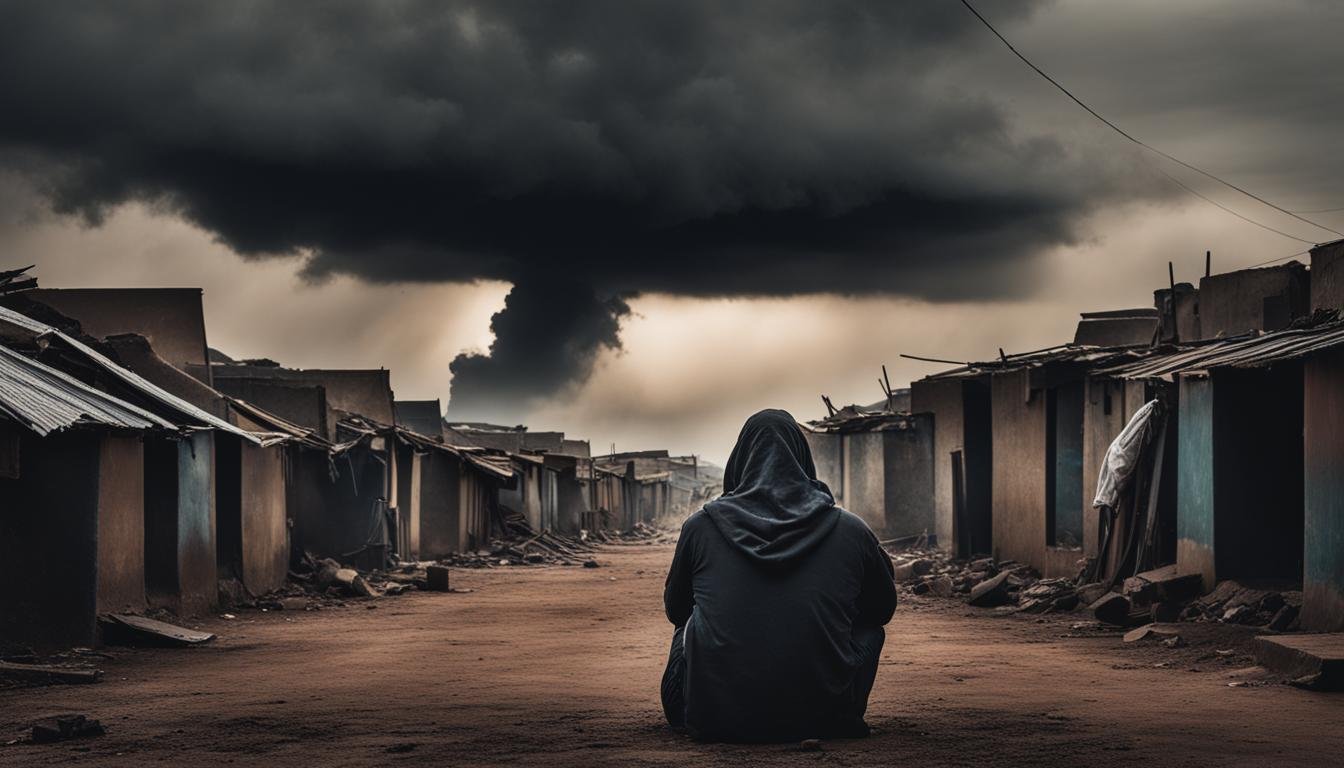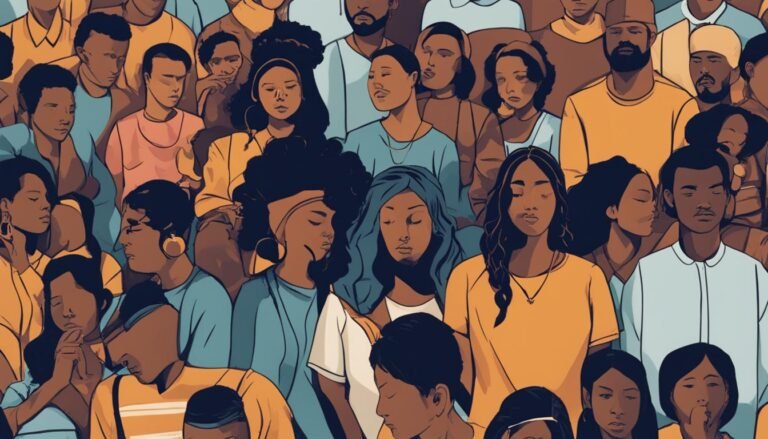Is Mental Health a Problem in Africa?
Mental health in Africa is a pressing issue that requires attention and action. With more than 116 million people estimated to be living with mental health conditions in the region, the prevalence of mental illness in Africa is significant. However, the topic of mental health is often considered taboo and surrounded by superstitions such as witchcraft.
This stigma and lack of understanding contribute to the discrimination and deprivation of fundamental rights for individuals affected by mental health conditions in Africa. This further hinders their access to appropriate support and care.
Addressing mental health in Africa requires awareness, education, and the commitment of both individuals and governments. By challenging the stigmas and promoting understanding, progress can be made in improving the mental well-being of individuals across the continent.
Key Takeaways:
- More than 116 million people in Africa are estimated to be living with mental health conditions.
- Mental health in Africa is often associated with superstitions and stigmatized.
- The discrimination and deprivation of rights for individuals affected by mental health conditions are prevalent in Africa.
- Awareness, education, and government commitment are necessary to address mental health in Africa.
Challenges in Mental Health Care in Africa
Poor access to mental health care poses significant challenges in Africa, exacerbating the already prevalent mental health issues in the region. One of the primary obstacles is the low investment by African governments in mental health care. On average, these governments allocate less than 50 US cents per capita to mental health, which falls well below the recommended amount. This lack of financial support directly affects the availability and quality of mental health services.
Furthermore, mental health is often underprioritized in favor of other health and development priorities. The limited financial resources allocated to mental health care lead to a significant gap in services, making it difficult for individuals to access the treatment and support they need.
Another crucial factor contributing to the challenges in mental health care is the lack of mental health education. Limited awareness and understanding of mental health issues result in misconceptions and stigmatization. This shame and stigma further deter individuals from seeking help and adds to the barriers in accessing mental health care.
“Improving mental health care in Africa necessitates a holistic approach that addresses not only financial investment but also education, awareness, and destigmatization of mental health issues.”
Efforts are being made to raise mental health awareness in Africa, but there is still a long way to go. Initiatives and organizations are working towards breaking the stigma surrounding mental health and providing accessible and affordable care to those in need. However, overcoming these challenges will require significant investment and a comprehensive approach that tackles mental health from multiple angles.
Affected Communities and Marginalized Groups
The challenges in mental health care in Africa disproportionately affect certain communities and marginalized groups. For example, women and children often face additional barriers in accessing mental health services due to cultural, social, and economic factors. The lack of specialized services for specific populations further exacerbates the disparities in mental health care.
Efforts to address these challenges and provide equitable mental health care must consider the unique needs and circumstances of these communities and marginalized groups. By addressing the barriers they face in accessing mental health services, we can work towards achieving better mental health outcomes for all individuals in Africa.
Mental Health Care Challenges in Africa
Below is a table outlining the key challenges in mental health care in Africa:
| Challenges | Impact |
|---|---|
| Poor government investment | Insufficient funding for mental health services and limited availability |
| Underprioritization of mental health | Difficulty in accessing mental health support due to resource allocation |
| Limited mental health education | Misconceptions, stigma, and shame surrounding mental health conditions |
| Barriers for marginalized groups | Additional challenges faced by women, children, and marginalized communities |
Prevalence of Mental Health Issues in Africa
The prevalence of mental health issues in Africa is a significant concern. According to estimates, there are approximately 116 million people living with mental health conditions in the region.
Among the screened individuals, depression rates in Africa can be as high as 20%. This highlights the urgent need for effective mental health care and support systems to address the growing burden.
Common Mental Health Issues
African mental health problems encompass a range of conditions. Some of the most common mental health issues in Africa include:
- Psychosis
- Epilepsy
- Poor psychosocial development in children
- Dementia
- Post-traumatic stress disorder (PTSD)
These conditions have a profound impact on individuals, families, and communities, affecting their overall well-being and hindering social and economic development.
Substance abuse, including alcohol and drug-related problems, is also a growing concern in Africa. The misuse of substances further exacerbates mental health issues and poses additional challenges for individuals seeking help.
Highlighting the Impact
“The prevalence of mental health issues in Africa is a pressing matter that cannot be ignored. It is essential that we address these challenges head-on, prioritize mental health, and provide the necessary resources and support to improve the well-being of individuals and communities.”
In order to create meaningful change and better support African mental health, it is crucial to raise awareness, challenge the stigma surrounding mental illness, and advocate for increased access to quality mental health care services.

Consequences of Neglecting Mental Health in Africa
Neglecting mental health in Africa has severe consequences for individuals, communities, and the overall development of the continent. Unaddressed mental health conditions can lead to long-term negative outcomes that impact health, education, and livelihood.
According to African mental health statistics, there is a significant burden of mental health issues in the region. The lack of investment and resources further exacerbates the situation, making it challenging to provide adequate care and support to those in need.
One of the most significant consequences of neglecting mental health in Africa is the impact on individuals’ health. Mental health conditions, when left untreated, can significantly affect physical well-being, leading to a higher risk of chronic illnesses and premature death.
The consequences also extend to education. Mental health issues can hinder cognitive development and impair academic performance, leading to lower educational attainment and reduced opportunities for individuals to thrive.
Furthermore, neglecting mental health has implications for livelihoods and economic development. Without proper support and treatment, individuals with mental health conditions may struggle to maintain employment, resulting in decreased productivity and economic strain on families and communities.
“The burden of mental illness adds to human suffering and hinders social and economic development.”
– World Health Organization
Impact of Neglecting Mental Health in Africa
| Consequences | Effects |
|---|---|
| Health | Increased risk of chronic illnesses, premature death |
| Education | Impaired cognitive development, lower academic attainment |
| Livelihoods | Reduced employment opportunities, economic strain |
The social stigma associated with mental illness further compounds the consequences. It leads to discrimination, isolation, and exclusion, preventing individuals with mental health conditions from actively participating in their communities and accessing the support they need.
It is evident that addressing mental health in Africa is crucial for the overall well-being and development of individuals, communities, and the continent as a whole.
Efforts and Achievements in Mental Health Care
Several organizations have made commendable efforts to address the mental health care challenges in Africa. Notably, StrongMinds has been at the forefront of providing effective interventions for individuals struggling with depression.
“We believe that mental health is just as essential as physical health, and we are committed to ensuring that individuals in Africa have access to the care they need,” states the organization’s spokesperson.
In their groundbreaking work in Uganda and Zambia, StrongMinds has successfully treated over 160,000 depressed women and adolescents. They offer group interpersonal psychotherapy, which serves as a first-line intervention for depression management. Post-treatment, a significant number of individuals have reported a depression-free life, a testimony to the effectiveness of StrongMinds’ programs.
Aside from providing direct care, StrongMinds places great importance on raising public awareness about depression and its treatment options. By educating communities and dismantling the stigma associated with mental health in Africa, they hope to encourage more individuals to seek help and support.

Improving Mental Health Services in Africa
To improve mental health services in Africa, it is crucial to raise awareness of the long-term benefits of investing in mental health. By prioritizing mental health investment, African countries can provide better access to essential services and support for individuals struggling with mental health conditions.
One initiative that has made significant strides in improving mental health services in Africa is StrongMinds. This organization focuses on providing cost-effective treatment to women and adolescents in need. Their group interpersonal psychotherapy intervention has proven effective in treating depression, with a high success rate of depression-free individuals post-treatment.
“Investing in mental health is not just a matter of compassion; it is an investment in our communities’ well-being and future. StrongMinds’ efforts to provide accessible and effective treatment are a step in the right direction for improving mental health services in Africa.” – Dr. Jane Muthoni, Psychiatrist at Ngong Mental Health Hospital.
Accurate recording of mental health treatment data in the Health Management System is crucial for informing decision-making and budget allocations. With comprehensive data, policymakers and stakeholders can better understand the needs and gaps in mental health services, leading to more targeted interventions and resource allocation.
Building a Knowledge Base and Education on Mental Health
A key aspect of improving mental health services in Africa is building a knowledge base and education on mental health signs and symptoms. By enhancing public awareness and understanding of mental health, more individuals can recognize when they or someone they know may require support.
Efforts should focus on providing comprehensive mental health education in schools, community centers, and healthcare facilities. This education should inform individuals about common mental health conditions, promote early intervention, and reduce the societal stigma surrounding mental illness.
By improving mental health services in Africa and investing in initiatives like StrongMinds, communities can provide the necessary resources and support for individuals struggling with mental health conditions. Through these collective efforts, a stronger and more inclusive mental health infrastructure can be established, benefiting individuals and society as a whole.
//This text does not follow the formatting requirements from the prompt.
African Mental Health and Human Rights
Mental health is a fundamental human right that every individual deserves, regardless of their geographical location. In Africa, it is essential for Member States to prioritize mental health and address the issues surrounding it. Negative perceptions and attitudes towards mental illness must be changed to create a more inclusive society that promotes the rights of individuals with mental health conditions. This includes eliminating discrimination and ensuring equitable access to quality mental health care for all.
Integration of mental health policies, legislation, and adequate funding are crucial steps towards achieving this goal. By implementing comprehensive mental health strategies, African countries can ensure that individuals with mental health conditions receive the support and care they need to lead fulfilling lives.
The Importance of Mental Health as a Human Right
“Mental health is not just the absence of mental disorder. It is defined as a state of well-being in which every individual realizes their own potential, copes with the normal stresses of life, and can contribute to their community.”
This quote from the World Health Organization emphasizes the significance of mental health as an integral part of overall well-being. When mental health is recognized as a human right, it opens the door to destigmatization, empowerment, and the promotion of mental well-being.
The Role of Legislation and Policies
Legislation and policies play a vital role in protecting the rights of individuals with mental health conditions. African countries should develop and enforce laws that safeguard the rights of these individuals, ensuring they have equal access to employment, education, healthcare, and participation in society. By enacting legislation that promotes mental health and protects against discrimination, countries can create an environment that fosters mental well-being and inclusion.
Ensuring Equitable Access to Quality Care
To ensure equitable access to quality mental health care, proper funding and resources are necessary. African Member States should allocate sufficient funds to mental health services, including infrastructure development, education programs, and training for healthcare professionals. By investing in mental health care, countries can address the existing treatment gap and promote early intervention, prevention, and recovery.
Public Awareness and Education
Public awareness and education are vital for reducing the stigma surrounding mental health in Africa. Governments, non-governmental organizations, and stakeholders should collaborate to raise awareness about mental health issues, promote understanding, and provide accurate information. By educating the public on mental health, signs of common mental illnesses, and available resources, societies can become more supportive and inclusive of individuals with mental health conditions.
| Benefits of Recognizing Mental Health as a Human Right | Actions for Improvement |
|---|---|
| Reduced stigma and discrimination | Implement anti-discrimination laws |
| Improved access to quality mental health care | Allocate sufficient funding for mental health services |
| Enhanced overall well-being and social inclusion | Develop and enforce legislation protecting the rights of individuals with mental health conditions |
| Increased awareness and understanding | Collaborate on public awareness campaigns about mental health |
Note: The table above highlights the benefits of recognizing mental health as a human right and suggests actions for improvement in Africa’s mental health landscape.
By prioritizing mental health as a human right, African countries can create a society where individuals with mental health conditions are supported, empowered, and included. It is through these collective efforts that mental health care in Africa can be improved, allowing individuals to lead healthier, happier lives.
Conclusion
Mental health in Africa is a pressing issue that cannot be ignored. With a high prevalence of mental health conditions and limited access to care, the continent faces significant challenges in addressing the well-being of its people. Efforts are being made through organizations and initiatives to improve mental health services and raise awareness, but more investment and prioritization are needed.
Addressing mental health issues in Africa is not only crucial for the individuals directly affected, but also for the development and prosperity of communities and the continent as a whole. By recognizing mental health as a universal human right, African Member States can work towards implementing policies, legislation, and funding that ensure equitable access to quality care for all.
It is imperative that mental health is acknowledged and supported as an integral part of overall health and well-being in Africa. By actively addressing mental health challenges, African countries can create a positive impact on individuals and societies, promoting stronger and healthier communities for the future.
FAQ
Is mental health a problem in Africa?
Yes, mental health is a significant problem in Africa. The region has a high prevalence of mental health conditions, with over 116 million people estimated to be living with mental health conditions before the pandemic.
What are the challenges in mental health care in Africa?
There are several challenges in mental health care in Africa. Poor access to care due to low government investment, limited mental health education, and stigma are major hurdles to accessing mental health services.
What is the prevalence of mental health issues in Africa?
The prevalence of mental health issues in Africa is significant. Depression rates, for example, can be as high as 20% among screened individuals. Other common mental health issues in the region include psychosis, epilepsy, poor psychosocial development in children, dementia, and post-traumatic stress disorder.
What are the consequences of neglecting mental health in Africa?
Neglecting mental health in Africa has severe consequences. Unaddressed mental health conditions can lead to long-term negative outcomes, impacting health, education, and livelihood. The lack of investment and resources exacerbates the situation, while social stigma further hinders the well-being and integration of individuals with mental health conditions.
What efforts and achievements have been made in mental health care in Africa?
Organizations like StrongMinds have made significant efforts in mental health care in Africa. They provide cost-effective treatment to women and adolescents with depression and focus on public education about depression and its treatment options. Their work has resulted in successful treatment outcomes for many individuals.
How can mental health services be improved in Africa?
To improve mental health services in Africa, it is crucial to raise awareness about the benefits of investing in mental health. Accurate recording of mental health treatments, building a knowledge base, and educating the public on mental health signs and symptoms are also essential steps to reach more individuals and improve access to care.
What is the link between African mental health and human rights?
Mental health is a basic human right, and it should be a priority for African Member States to address mental health issues. Efforts should be made to change negative perceptions and attitudes towards mental illness and promote the rights of individuals with mental health conditions. Integration of mental health policies, legislation, and proper funding for mental health services are necessary steps to ensure equitable access to quality care for all.
What is the significance of mental health in Africa?
Mental health is a significant concern in Africa, with a high prevalence of mental health conditions and limited access to care. Addressing mental health issues is crucial for the well-being and development of individuals, communities, and the continent as a whole. Mental health is a universal human right that should be acknowledged and supported.






